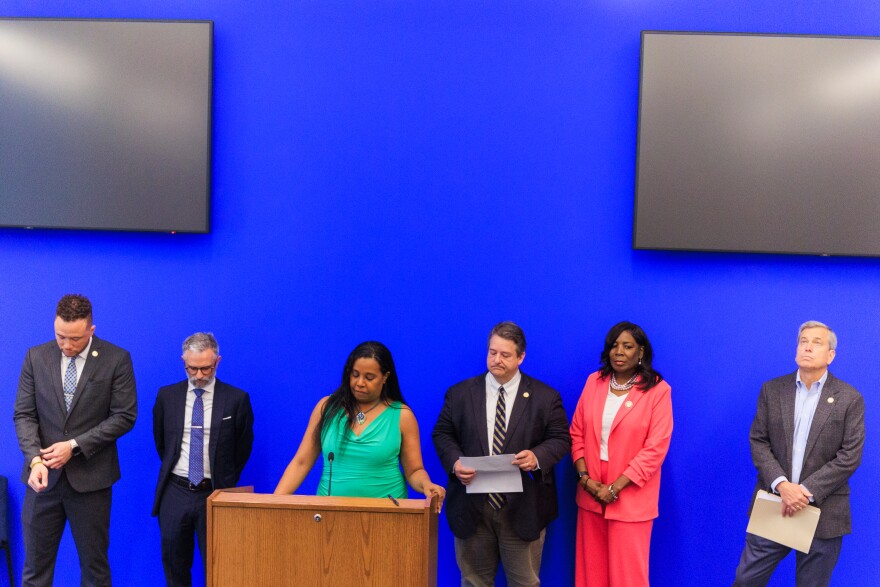A clause in the General Assembly’s version of the state budget that would have returned Virginia to the Regional Greenhouse Gas Initiative was cut during negotiations with Gov. Glenn Youngkin’s office this year.
Democrats in the House of Delegates held a Tuesday press conference at the Virginia Capitol to argue that the commonwealth is losing out on millions in climate resilience funding as a result.
“We did put $100 million in the budget to do the types of things that RGGI is going to do, but that's a temporary thing. We need a permanent solution, which RGGI provides,” said Del. Mark Sickles (D-Fairfax).
That cash will go to the Community Flood Preparedness Fund, which until recently was funded with RGGI proceeds.
RGGI is a carbon market made up of mostly Northeastern states. Major emitters in the region, including fossil-fueled power plants, are required to purchase carbon allowances during quarterly auctions. The number of available allowances dwindles over time, increasing the cost of carbon and, according to supporters, the incentive to invest in zero-carbon energy sources.
Virginia joined RGGI in 2020, and was a member until December 2023. In that time, the state brought in $827.7 million over 11 quarterly auctions. The money was split between flood mitigation and recovery, and energy efficiency programs.
Shortly after taking office, Youngkin ordered the State Air Pollution Control Board to strike regulations keeping Virginia in the program.
“It's simply a regressive tax hidden in utility bills passed on to all Virginians. Thanks to our withdrawal from RGGI, Virginians will see lower energy bills in due time,” Christian Martinez, Youngkin's press secretary, wrote in an email.
The governor argued that Virginia’s regulatory system, which passes on all electricity costs to customers, removes any incentive for power providers like Dominion Energy to decarbonize. At most, the utility charged $4.44 a month for a residential customer using 1,000 kilowatt-hours.

For some, including Billy Weitzenfeld, executive director of the Association of Energy Conservation Professionals — a group currently suing the state for leaving RGGI — those costs were worth the benefit they provided.
AECP represents groups and workers that weatherize homes within 60% of the state median income with federal and state dollars. Businesses offer energy audits for homes to determine where heating, cooling, electricity and more are being wasted. They then work to reduce that waste. But some homes that present health or safety risks to workers because of things like electrical or structural problems aren’t eligible for federally-funded weatherization.
“Twenty percent of eligible homes were being deferred [for safety]. We thought that was a pretty stunning number,” Weitzenfeld said.
Some RGGI auction proceeds are dedicated to the Weatherization Deferral Repair program administered by the state Department of Housing and Community Development. The program assists low-income homeowners in addressing energy efficiency, and health and safety issues.
Weitzenfeld estimated that weatherization and efficiency work reduces energy bills by an average of 25% to 30%.
“That's significant, particularly for a low-income family whose energy burden is so much higher than a middle-income or higher-income family,” Weitzenfeld said. “It's not just reducing the electric bill or the energy bill, but you're really impacting health costs, in many cases, because you're making the home healthier.”
He said the RGGI funds also resulted in more work for a wide range of tradespeople — roofers, electricians, HVAC contractors and more.
AEPC’s lawsuit is set to be heard in Floyd County. Del. Rip Sullivan (D-Fairfax) said Tuesday that parties in the suit are working with the judge to set a trial date. Attorneys with the Southern Environmental Law Center are arguing that Youngkin overstepped his authority by ordering Virginia to leave RGGI through regulatory action.
Democrats on Tuesday said an act of the General Assembly is required to leave the initiative.







